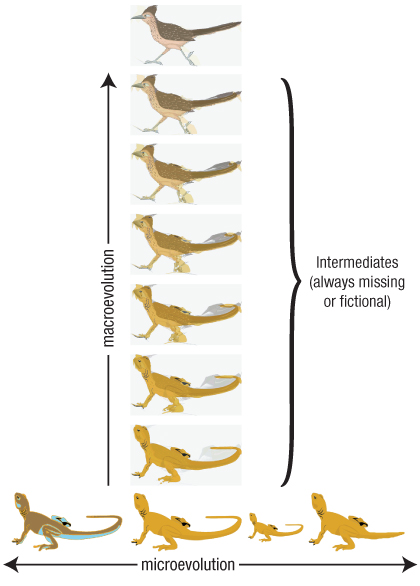Fossil Gaps 15
i.
“The [evolutionary]
origin of birds is largely a matter of deduction. There is no fossil evidence of the stages through which the remarkable change from reptile to bird was achieved.” W. E. Swinton, “The Origin of Birds,”
Biology and Comparative Physiology of Birds, editor A. J. Marshall (New York: Academic Press, 1960), Vol. 1, Chapter 1, p. 1.
Some have claimed birds evolved from a two-legged dinosaur known as a theropod. However, several problems exist.
A theropod dinosaur fossil found in China showed a lung mechanism completely incompatible with that of birds. [See John A. Ruben et al., “Lung Structure and Ventilation in Theropod Dinosaurs and Early Birds,”
Science, Vol. 278, 14 November 1997, pp. 1267–1270.] In that report,
“Ruben argues that a transition from a crocodilian to a bird lung would be impossible, because the transitional animal would have a life-threatening hernia or hole in its diaphragm.” [Ann Gibbons, “Lung Fossils Suggest Dinos Breathed in Cold Blood,”
Science, Vol. 278, 14 November 1997, p. 1230.]
Bird and theropod “hands” differ. Theropods have “fingers” I, II, and III (having lost the “ring finger” and little finger), while birds have fingers II, III, and IV.
“The developmental evidence of homology is problematic for the hypothesized theropod origin of birds.” [Ann C. Burke and Alan Feduccia, “Developmental Patterns and the Identification of Homologies in the Avian Hand,”
Science, Vol. 278, 24 October 1997, pp. 666–668.]
“... this important developmental evidence that birds have a II-III-IV digital formula, unlike the dinosaur I-II-III, is the most important barrier to belief in the dinosaur origin [for birds]
orthodoxy.” [Richard Hinchliffe, “The Forward March of the Bird-Dinosaurs Halted?”
Science, Vol. 278, 24 October 1997, p. 597.]
[
From “In the Beginning” by Walt Brown]



